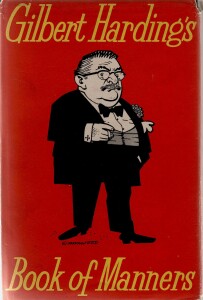 The recent sudden fall from grace of Tudor historian and broadcaster David Starkey over his remarks on the Black Lives Matter campaign recalls to mind another broadcaster of an earlier decade whose detractors also dubbed him ‘ the rudest man in Britain’—Gilbert Harding. This shared reputation comes to mind as we discovered a copy at Jot HQ of the very funny and often wise treatise on good behaviour, Gilbert Harding’s Book of Manners(1956).
The recent sudden fall from grace of Tudor historian and broadcaster David Starkey over his remarks on the Black Lives Matter campaign recalls to mind another broadcaster of an earlier decade whose detractors also dubbed him ‘ the rudest man in Britain’—Gilbert Harding. This shared reputation comes to mind as we discovered a copy at Jot HQ of the very funny and often wise treatise on good behaviour, Gilbert Harding’s Book of Manners(1956).
The two men had a number of other things in common. Both were from humble backgrounds and both were graduates of Cambridge University. Starkey came from Kendal, where his Quaker father worked as a factory foreman and his mother was once a cotton spinner. Harding was born in Hereford, where his mother and father were the ‘matron’ and ‘master’ of an orphanage in the city. When his father died aged thirty the young Gilbert was sent to a charitable educational institution. In contrast, Starkey, who considered studying science before opting for the humanities, had a somewhat easier path to academic distinction, though he had a breakdown at age 13. Starkey is openly gay, whereas Harding had to hide his sexuality at a time when homosexuality was illegal.
Both men became broadcasters, almost by accident. While teaching at the LSE Starkey, having obtained his Ph D on the household of Henry VIII, became a panel member of BBC Radio’s ‘Moral Maze ‘, which is where he obtained his reputation for plain speaking. By this time Harding had been dead for over twenty years, but it possible that the young Starkey might have been impressed enough by the broadcaster’s irascible performances on ‘What’s My Line ‘in the fifties to have thought about modelling himself on him at some future time. Harding had entered the BBC in his late twenties after short spells as a schoolteacher, policeman and foreign correspondent.
Harding’s main role on ‘What’s My line’ was to be outspoken and cantankerous, often to the point of rudeness. He had been a team member since the start of the series in 1951 and as his fame grew audiences came to expect some witty put down or controversial observation from him at every opportunity. Outside the studio he was often mobbed by admirers and there is little doubt that as he worked himself into the role of irascible old bachelor he played up to the gallery, as Starkey has also admitted to doing. A remark from each of these similar broadcasters serve to show that both men had a talent for put-downs. At a wedding reception Harding responded to the usual platitude from a well-wisher to the effect that bride and groom would make a happy couple with the observation that “You should know; you’ve slept with both of them!”. Similarly, on an edition of ‘The Moral Maze’ that I recall vividly Starkey found himself at loggerheads with the journalist and historian Paul Johnson, who had repeatedly called him a ’little man ‘. Starkey responded by telling him that ‘there are two things that I have that aresmaller than yours and these are my nose and my liver.”
A brilliant and well deserved rejoinder that sticks in the mind, rather like Winston Churchill’s famous reply to Lady Astor, who had accused him of being drunk in the Commons Chamber. Harding’s Manners, which was formed of chapters variously headed Manners in Love , The Fib, Press Manners, Advertising, Money, Business, Public Transport, is a tour de forceof hilarious anecdotes and astute reflections on human behaviour which show the broadcaster in top form. Harding was at the height of his fame when the book appeared and it must have sold well, if the number of copies on Abebooks is any indication. Fast forward four years to 1960 and that fateful TV encounter with John Freeman which showed Harding’s gruff persona crumbling under some searching questions about his mother. Only weeks later Harding was dead aged just 53. He had collapsed while getting out of a taxi following a broadcast. Harding was an asthmatic, but as he pointed to his head during the attack it is likely that he suffered a stroke. His death was not entirely unexpected, though his fans were shocked at its suddenness. His lifestyle was seriously unhealthy. He was overweight and was partial to alcohol and restaurant meals, references to which abound in Manners. [R.M.Healey ]

Excellent. Made me think of a few other rude people– Piers Morgan, James Corden, John Lennon, Germaine Greer, Churchill (mentioned) John Osborne, Dorothy Parker, Johnny Rotten, Oliver Reed, Truman Capote…still thinking.